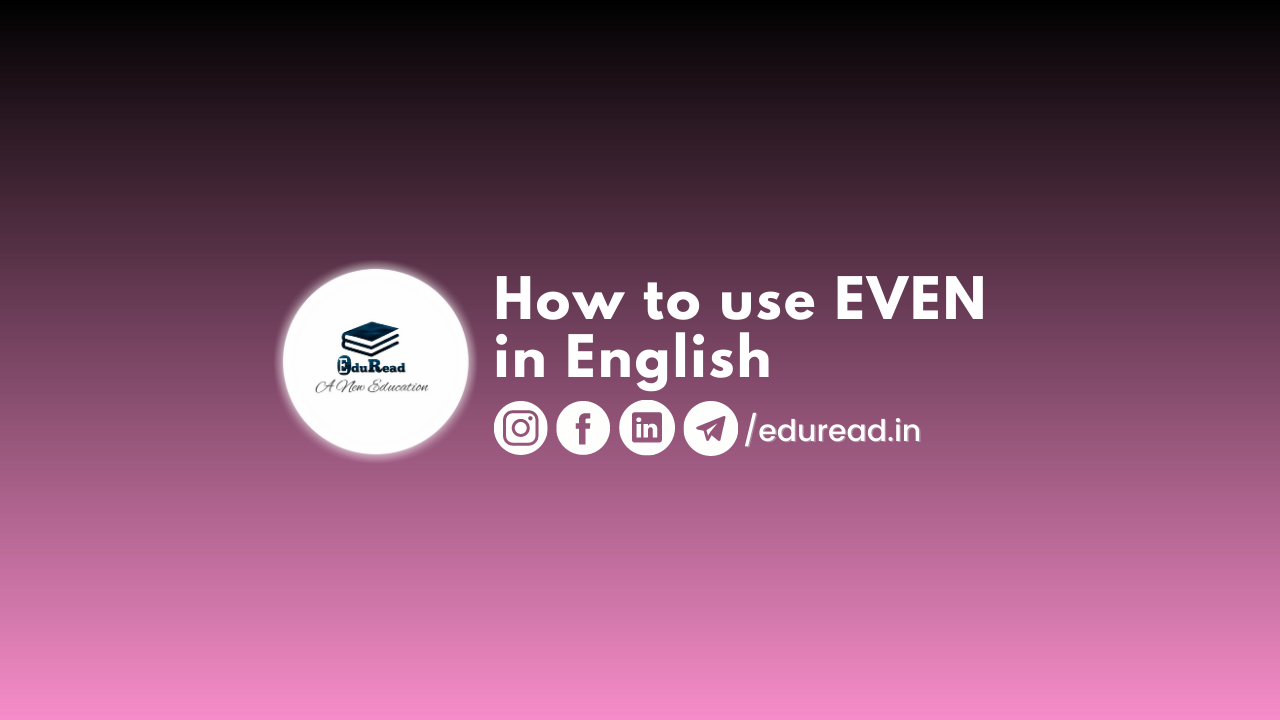Have you ever wondered how to use the word “even” in English? Even though it’s a common word, it can be tricky to use correctly. In this blog post, we’ll discuss the different ways to use “even” in English and provide examples to help you understand how to use it effectively.
To emphasize something unexpected or surprising apply “even” to emphasize something that is unexpected or surprising, such as:
- “She even brought her own food to the restaurant.”
- “I can’t believe he even showed up to the party.”
- “They’re going to Europe for vacation, and they don’t even have passports.”
To indicate equality or balance apply “even” to indicate equality or balance, such as:
- “The teams are even in terms of skill.”
- “I owe you $20, but we’re even because you paid for dinner last night.”
- “She worked even harder than I did to get that promotion.”
To add something to a previous statement apply “even” to add something to a previous statement, such as:
- “I like ice cream, even though it gives me brain freeze.”
- “He’s a great athlete, even though he’s never played professionally.”
- “She’s very successful in her career, even though she didn’t finish college.”
To express doubt or uncertainty Use “even” to express doubt or uncertainty, such as:
- “I’m not sure if I can finish this project, even with extra help.”
- “Even if I study all night, I’m not sure I’ll pass the exam.”
- “He may be a good candidate, but even so, we need to do more research.”
To express a hypothetical situation Use “even” to express a hypothetical situation, such as:
- “Even if I won the lottery, I would still work.”
- “Even if it rains, we’re still going to the beach.”
- “Even if we’re late, the party will still be going on.”
To express a concession or agreement make use of “even” to express a concession or agreement, such as:
- “I know you’re busy, but can you even spare a few minutes to talk?”
- “I don’t agree with him, but even so, I see his point.”
- “Even though I don’t like the movie, I have to admit the special effects are impressive.”
To intensify a comparison or contrast make use of “even” to intensify a comparison or contrast, such as:
- “He’s taller than me, but she’s even taller than him.”
- “The first movie was good, but the sequel is even better.”
- “I thought the traffic was bad yesterday, but today it’s even worse.”
To indicate a limit or boundary make use of “even” to indicate a limit or boundary, such as:
- “I can’t run for even a minute without getting winded.”
- “The temperature dropped to even lower than expected.”
- “She doesn’t like spicy food, not even a little bit.”
To show surprise or disbelief make use of “even” to show surprise or disbelief, such as:
- “I can’t even believe how much he spent on that car.”
- “She didn’t even bother to show up for the meeting.”
- “He’s so lazy, he can’t even get out of bed before noon.”
To make a suggestion or recommendation make use of “even” to make a suggestion or recommendation, such as:
- “You should even try the sushi, even if you’ve never had it before.”
- “Even if you’re not interested in the book, I recommend you read it.”
- “You should even consider taking an online course, even if you think you already know the subject.”
Tips for using “even” effectively in English:
- Pay attention to the context of the sentence to determine the appropriate use of “even.”
- Be careful not to overuse “even” in your writing or speaking.
- Use “even” sparingly to add emphasis or surprise to your statements.
- Practice using “even” in different contexts to improve your fluency in English.
Common mistakes when using “even”:
- Using “even” too often or incorrectly can make your writing or speaking sound unnatural.
- Confusing the use of “even” to express surprise or disbelief with the use of “even though” to indicate a contrast.
- Using “even” without a clear context or purpose can confuse the meaning of your sentence.
Conclusion
In conclusion, “even” is a versatile word that can be used in many different ways in English. By understanding the different contexts in which “even” can be used, you can use it effectively to add emphasis, express surprise or disbelief, indicate equality or balance, make a suggestion or recommendation, and more. With practice, you can improve your fluency in English and make use of “even” naturally in your writing and speaking.
Follow Us for more such content to improve your speaking skills:
To know more, check out here: https://eduread.in/short-english-sentences-to-use-everyday-speak-new-york/
And visit us for more.
